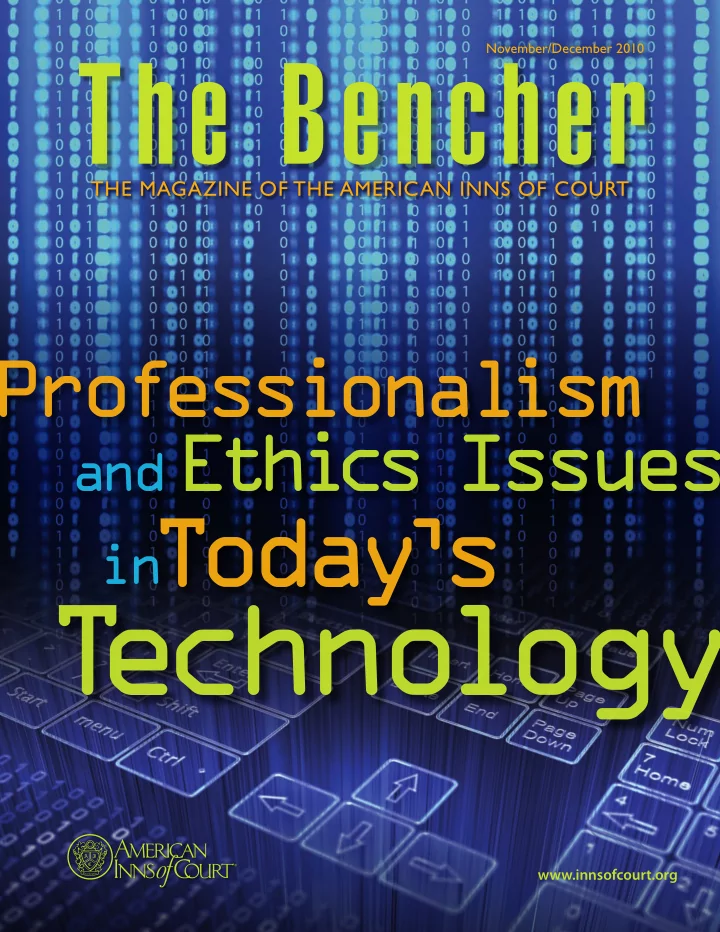

November/December 2010 THE MAGAZINE OF THE AMERICAN INNS OF COURT Prof essional ism Ethi cs Issues and Today ’ s in T echno logy www.innsofcourt.org
y c n e r a p s n a r T n i : y r e v o c s i D - E No Longer a Novel Approach By Michael J. Gray and Emmy H. Koh This article, used with permission from the American Inns of Court and Michael J. Gray, Esquire, and Emmy H. Koh, Esquire was originally published in the November/December 2010 issue of The Bencher , a bi-monthly publication of the American Inns of Court. Inquiries about this article should be directed to the American Inns of Court The Bencher ◆ November/December 2010 ◆ www.innsofcourt.org 12
A lthough litigation’s adversarial nature and transparency between opposing counsel, as well as a the desire to keep decision-making close working knowledge of how to preserve and produce to the vest tend to cut against transpar- electronically stored information.” Additionally, there ency and cooperation in discovery, being has been a more frequent issuance of judicial opinions forthcoming and clear about electronic discovery sanctioning parties for their failure to comply with their reduces unnecessary court battles, eliminates possible e-discovery obligations. sanctions and, in fact, often reduces the overall costs Transparency does not mean showing your cards of discovery. Indeed, cooperation during discovery is as to the merits of the case or your work product; not a novel idea. Rule 26(f) of the Federal Rules of Civil rather, it means that certain decision-making as to Procedure, amended in 2006, expressly provides that the scope and collection of electronic documents parties are required to meet and confer regarding “any is best shared with your opponent and often is a issues about disclosure or discovery of electronically point of negotiation. As one recent article points out: stored information,” and specifically, regarding the “[C]ooperation in discovery simply demands that scope of discovery, the format of production and the parties and their counsel be knowledgeable about assertion of privilege. Other states, such as California, have adopted rules mirroring these requirements. See “It is time that the Bar— even California Rule of Court 3.724. those lawyers who did not come In 2008, the Sedona Conference—a nonprofit of age in the computer era— educational institute composed of jurists, attorneys and academics—issued its “Cooperation Proclamation,” understand” that electronic a three page document calling on participants in the discovery requires cooperation civil discovery process in the United States to “promote and transparency between opposing open and forthright information sharing, dialogue (internal and external), training, and the development counsel, as well as a working of practical tools to facilitate cooperative, collabora- knowledge of how to preserve tive, transparent discovery.” The Proclamation goes on and produce electronically to state that: “Cooperation does not conflict with the advancement of their clients’ interests—it enhances it. stored information.” Only when lawyers confuse advocacy with adversarial conduct are these twin duties in conflict.” Some may their information management systems, the reposi- discount the pronouncement as impractical, but a tories of relevant data (and those that are likely to closer evaluation of recent decisions reveals its wisdom. yield the most relevant and accessible data), and the key players and custodians of information—and that Since the Proclamation’s publication, courts have they engage in an open and frank dialogue about increasingly demanded this cooperative approach these items to formulate a discovery plan that will to the discovery process, leading to negative permit a fair assessment of the case on the merits consequences to those that did not. See, e.g., Rimkus and be cost efficient. Toward a Less Hostile Discovery Consulting Group, Inc. v. Cammarata , 688 F.Supp.2d Process , Ariana J. Tadler, Kenneth J. Withers. 598 (S.D. Tex. 2010) (spoliation of evidence in bad faith led to adverse inference sanctions); Pension Comm. of Specifically, attorneys should (1) try to reach to an Univ. of Montreal Pension Plan v. Banc of Am. Sec. , 685 agreement, early in the litigation, regarding the F.Supp.2d 456 (S.D.N.Y. 2010) (spoliation instruction and sources of relevant data sources as well as those that monetary sanctions were warranted against investors would be searched during the discovery process and whose failure to preserve evidence amounted to gross (2) identify the methods that will be implemented negligence). As of May 31, 2010, more than 100 judges in order to search for relevant information, discuss across the country have endorsed the Cooperation these methods with counsel and, on many occasions, Proclamation and more than a dozen courts have agree to the selection of relevant search terms. cited to the Proclamation in their e-discovery opinions. Exchange information regarding the sources Notably, in William A. Gross Constr. Assoc., Inc. v. Am. Mfg. of relevant electronic discovery and attempt Mut. Ins. Co. , 256 F.R.D. 134 (S.D.N.Y. 2009), Magistrate to reach an agreement regarding which Judge Andrew J. Peck—a leading jurist on electronic sources will be searched. discovery and prolific writer on the topic—noted that: Identifying and disclosing the relevant sources of “It is time that the Bar—even those lawyers who did electronically stored information (“ESI”) early on, not come of age in the computer era—understand” that electronic discovery requires cooperation and Continued on the next page. The Bencher ◆ November/December 2010 ◆ www.innsofcourt.org 13
Recommend
More recommend